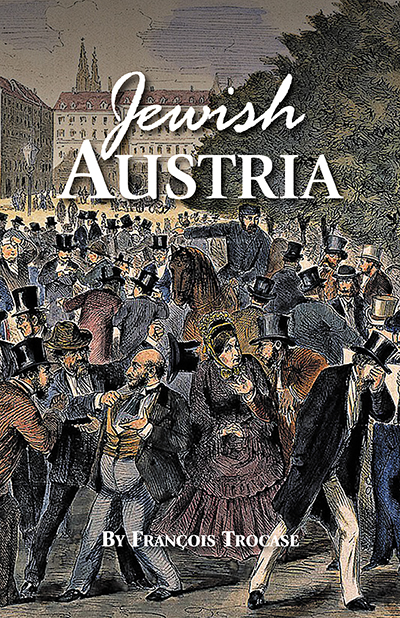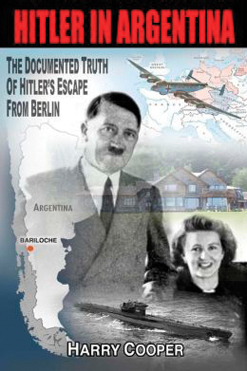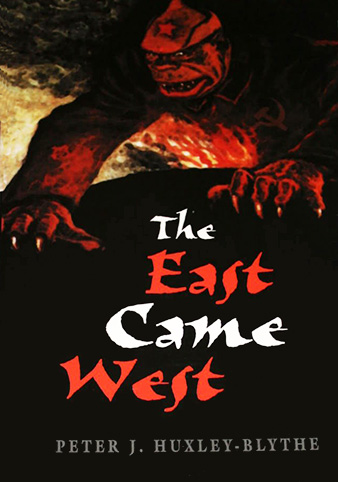Description
Jewish Austria provides a crucial insight into the role played by the Jews in the collapse of this venerable Catholic empire at the heart of Europe.
This is the abridged 1942 edition—completely re-set and illustrated—by Léon de Poncins of François Trocase’s remarkable 1899 study of the end of the Austro-Hungarian Empire.
More focused than Édouard Drumont’s extensive historic survey, La France Juive (1886), Trocase’s work presents an objective and detailed analysis of the economic and social conditions of the Austrian Empire in its last days.
Poncins’ readable edition of Trocase’s thorough investigation of the modus operandi of Jewry continues to have an urgent relevance to the socio-economic and political conditions of contemporary Western states.
Table of Contents
- Introduction: Dr. Alexander Jacob Preface: Léon de Poncins
- Jewish Austria—François Trocase
- Foreword: Dr. Alexander Jacob
- I. The Fate of an Empire
- II. The Dynasty
- III. The Agony Brief Overview of the Internal Situation of Austria
- IV. Justice
- V. The State Police
- VI. Socialism
- VII. Socialism and the Jews
- VIII. The Jewish Problem
- IX. The Conquest of Austria by the Jews
- X. The Jewish Doctors in Vienna
- XI. The Jewish Press
- XII. The Judaization of Austrian Society
- XIII. Exploiters and Exploited
- XIV. The Seductions
- XV. The Anti-Semitic Movement
- XVI. The Defenses on Behalf of the Jews
- XVII. Will the Jews Be Masters of Europe?
- XVIII. Summary and Conclusions
- The End of Austria-Hungary: Léon de Poncins
- Conclusion: Léon de Poncins
Preface
By Léon de Poncins
In 1899 there appeared a stunning book that, however, remained unknown until now: Jewish Austria by François Trocase, a work in 8o published by A. Pierre, 37 rue Étienne Marcel, Paris.
This book, the significance of which grows with the passing of the years, is marked by such a prophetic character that one would be tempted to consider its author as belonging to the great visionaries of history—if this term were not fundamentally imprecise. When one speaks of a visionary, one imagines a person plunged into ecstasy and foreseeing the future through the force of a supernatural intuition alone.
Such is certainly not the case with Trocase, quite the contrary: this is a lucid and cold observer, but clairvoyant, terribly clairvoyant. He examines in 1899 the internal situation in Austria and its repercussions on international politics as well as on the future of Europe. In calm, measured terms, but with an implacable rigor, he depicts for us its internal decomposition through the slow infiltration of Judaism.
As a clinician may do, he diagnoses the disease and shows the infection progressively affecting all the cogs of the country. In its clarity, its precision, and absence of passion, this description is hallucinating: We see the Jewish proliferate before our eyes, infiltrate everywhere, corrupt, and finally destroy an empire with a past grandeur that lasted seven centuries long. A solemn warning issued to the West about the old Jewish corruption, 3,000 years old, but everywhere identical, everywhere present, everywhere formidable. It is, besides, as a warning to France that Trocase had conceived this work. … But let us proceed. Such then is the first part of Trocase’s work: he observes, notices and describes.
But that is not all, that is not even the main thing: everywhere from the observation of facts, Trocase foresees what will happen—not only in Austria but in Europe and, more particularly, in France. Thus we rise to the historical drama. Better than any military man, diplomat or professional politician, this unknown Frenchman has seen everything, foreseen everything, announced everything, nothing has escaped him, and he has not been mistaken even once. After 40 years his work seems like one of the most astonishing prophecies contained in an old book of spells of foregone times.
Trocase announces as ineluctable the imminent agony of the Austro-Hungarian Empire, he foresees that Franz Joseph will be the last of the Habsburgs, he announces the mistake of the Jewish rush into Germany and, as a backlash, the anti-Semitism of the Third Reich, he describes in advance the Hitlerian nationalist racism, he speaks to us of the Anschluss as an eyewitness of 1938 might have, he predicts Judeo-Russian Bolshevism and its sinister Red terror; he is worried about France and poses this anguished question:
After Austria, will it be France that will appear as the designated victim of the rabbinical maxims? Is it the history of our beautiful France that is inscribed in letters of fire in the annals of the Habsburg monarchy?
But we could not finish enumerating everything Trocase foresaw. Rarely, in fact, has any writer in the world seen his predictions realized so fully. Jewish Austria deserves, on account of this fact, a fame equivalent to that of the mysterious Protocols, compared to which he has the advantage of an authenticity that is indisputable. All those who are rightly troubled by the Jewish peril should become acquainted with this work, learn it by heart, imbue themselves with every line of it, for the Western “Great Democracies” follow step by step the path that has led Austria to its grave and France to disaster in 1940.
Its author has remained perfectly obscure, as it happens customarily to those that Israel does not regard with a favorable eye and, in spite of our researches, we know about him only what these few lines of his Preface tell us about him: Our readers will wonder how a French publicist was able to penetrate in this way to the bottom of things and compose a rigorously exact account of what is happening in a foreign country. The explanation is quite simple.
The author of his book was born of French parents in the capital of Austria. After having occupied a professorship in a college in Vienna, he pursued there for 22 years the profession of a journalist energetically defending the interests of his country in the press. He was in this way initiated quite naturally into all the details of the political, economic and social life of the empire of the Habsburgs. He saw the men and the affairs from close quarters and was in a position, as a Frenchman, to judge them with total impartiality.
The printer, Paul Dupont, at whose establishment we made inquiries, still lives at the same address, 4 rue de Boulot, in Paris, but, having printed this book for a publisher who has disappeared today, he could not give us any information about the personality of François Trocase.
It is of little importance after all, for the text speaks for itself. We shall reproduce the essential pages from it, contenting ourselves with highlighting in bold letters the most striking passages, and adding to it some notes comparing the past of those times to the present of today. Let us recall that this book was written 40 years ago and, in the light of the historic catastrophes announced by this prophet, let us now hear from François Trocase.—Léon de Poncins
Softvcover, 97 pages #904.


